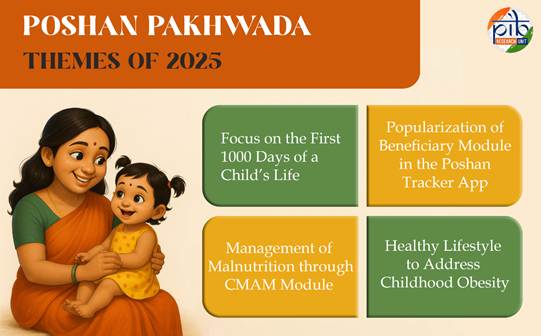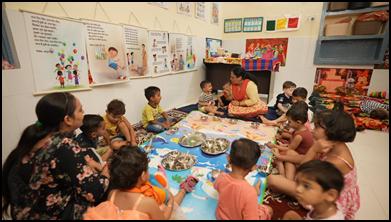The Ministry of Women and Child Development (MWCD) has launched the 7th edition of Poshan Pakhwada, being observed from April 8 to 22, as part of the government’s intensified efforts to tackle malnutrition. Running in collaboration with multiple ministries and state departments, this year’s campaign underscores four core themes—maternal and infant nutrition in the first 1,000 days of life, promotion of the Poshan Tracker app, community-based management of malnutrition (CMAM), and encouraging a healthy lifestyle to combat childhood obesity, as stated by the Ministry of Women and Child Development on Monday.
Poshan Pakhwada 2025
Union Minister for Women and Child Development, Annpurna Devi, is scheduled to visit Arunachal Pradesh to review ongoing nutrition initiatives, while Minister of State Savitri Thakur will inaugurate the campaign by addressing Anganwadi workers, officials of the State WCD departments, and representatives from 18 partner ministries via webcast. Community-level outreach such as village camps, home visits, and educational drives will form the backbone of this outcome-oriented campaign.
Since its inception in 2018, Poshan Abhiyaan has emerged as a flagship mission aimed at improving nutritional outcomes for women and children. Central to the 2025 campaign is the emphasis on the first 1,000 days from conception to a child’s second birthday, widely recognized as a critical window for brain and body development. This period will be used to educate families about proper breastfeeding, balanced diets, and early childhood stimulation—particularly in tribal and remote areas where local diets play a significant role.
Technology is also playing a pivotal role. The AI-enabled Poshan Tracker, launched in 2021, has now registered all Anganwadi centres in India and enables real-time tracking of beneficiaries, meal distribution, and health metrics. Families can now self-register via the web application to monitor their own nutritional progress. The CMAM protocol, introduced in October 2023, further enables Anganwadi workers to identify and treat acutely malnourished children at the grassroots level.
Palna Scheme under Mission Shakti
The government is also addressing the increasing need for childcare support through the Palna Scheme, implemented under the Samarthya sub-scheme of Mission Shakti. Palna provides quality crèche services for children aged six months to six years, helping working mothers balance employment and childcare responsibilities in today’s nuclear family settings. The scheme supports daycare, early stimulation, preschool education, nutritional meals, growth monitoring, and immunization.
Initially known as the National Crèche Scheme, Palna was restructured in 2022 and is now a centrally sponsored program shared between the Centre and States/UTs in a 60:40 ratio (90:10 for special category states). It mandates crèche facilities in establishments with 50 or more employees under the amended Maternity Benefit Act.
There are two types of crèches under Palna—Standalone Crèches and Anganwadi-cum-Crèches (AWCCs). As of March 2025, 11,395 AWCCs have been approved across 34 States and UTs, and 1,761 are operational, serving 28,783 children. Additionally, 1,284 Standalone Crèches are functioning with 23,368 beneficiaries. The government aims to establish 17,000 new AWCCs in 2024–25.
Each crèche accommodates up to 25 children and is designed to be located near the child’s home or mother’s workplace to ensure ease of access and continued breastfeeding. Creche Workers and Helpers receive a monthly honorarium, with States having the option to top-up from their own funds.





















